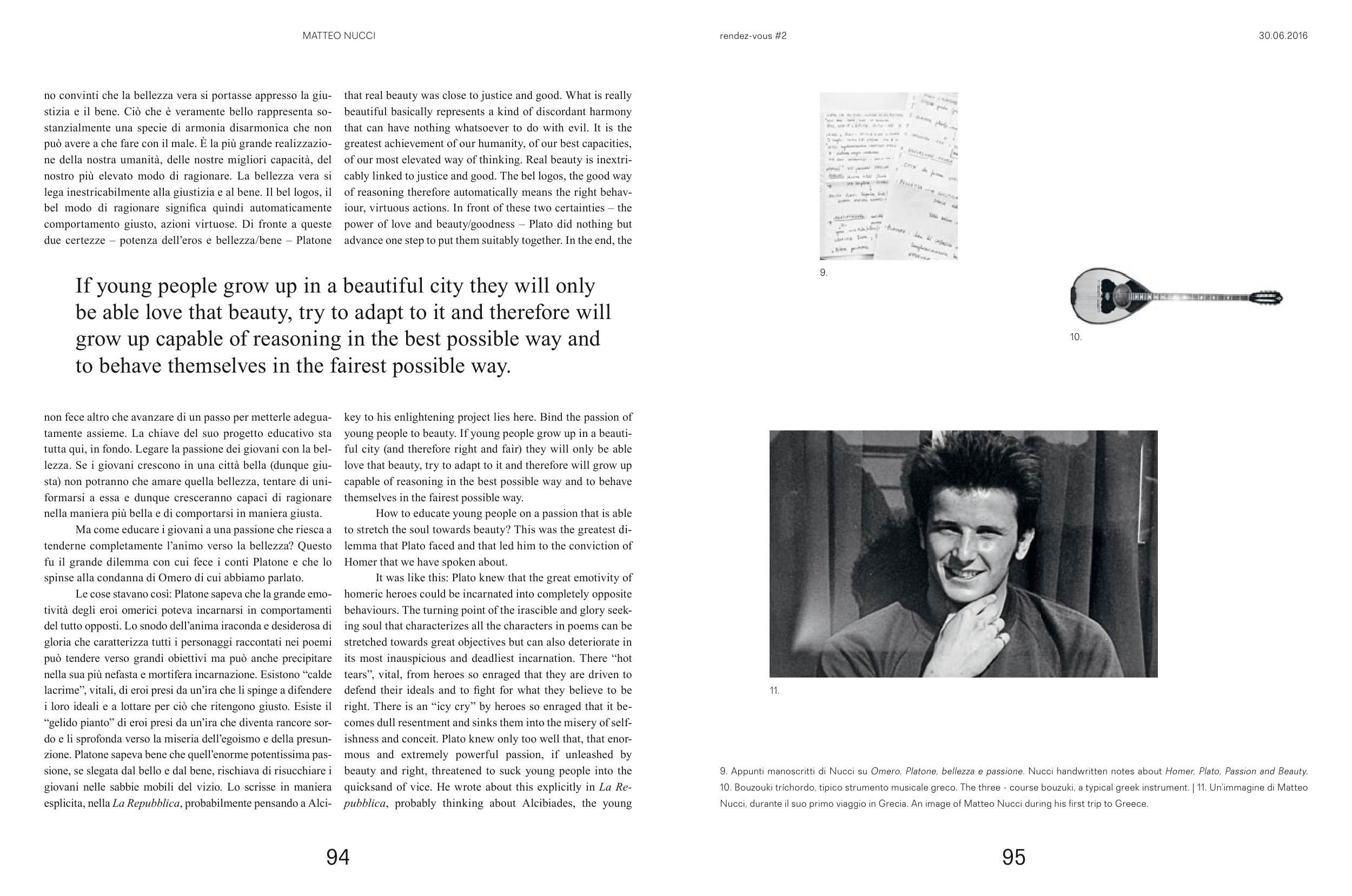94
95
no convinti che la bellezza vera si portasse appresso la giu-
stizia e il bene. Ciò che è veramente bello rappresenta so-
stanzialmente una specie di armonia disarmonica che non
può avere a che fare con il male. È la più grande realizzazio-
ne della nostra umanità, delle nostre migliori capacità, del
nostro più elevato modo di ragionare. La bellezza vera si
lega inestricabilmente alla giustizia e al bene. Il bel logos, il
bel modo di ragionare signifi ca quindi automaticamente
comportamento giusto, azioni virtuose. Di fronte a queste
due certezze – potenza dell’eros e bellezza/bene – Platone
that real beauty was close to justice and good. What is really
beautiful basically represents a kind of discordant harmony
that can have nothing whatsoever to do with evil. It is the
greatest achievement of our humanity, of our best capacities,
of our most elevated way of thinking. Real beauty is inextri-
cably linked to justice and good. The bel logos, the good way
of reasoning therefore automatically means the right behav-
iour, virtuous actions. In front of these two certainties – the
power of love and beauty/goodness – Plato did nothing but
advance one step to put them suitably together. In the end, the
If young people grow up in a beautiful city they will only
be able love that beauty, try to adapt to it and therefore will
grow up capable of reasoning in the best possible way and
to behave themselves in the fairest possible way.
non fece altro che avanzare di un passo per metterle adegua-
tamente assieme. La chiave del suo progetto educativo sta
tutta qui, in fondo. Legare la passione dei giovani con la bel-
lezza. Se i giovani crescono in una città bella (dunque giu-
sta) non potranno che amare quella bellezza, tentare di uni-
formarsi a essa e dunque cresceranno capaci di ragionare
nella maniera più bella e di comportarsi in maniera giusta.
Ma come educare i giovani a una passione che riesca a
tenderne completamente l’animo verso la bellezza? Questo
fu il grande dilemma con cui fece i conti Platone e che lo
spinse alla condanna di Omero di cui abbiamo parlato.
Le cose stavano così: Platone sapeva che la grande emo-
tività degli eroi omerici poteva incarnarsi in comportamenti
del tutto opposti. Lo snodo dell’anima iraconda e desiderosa di
gloria che caratterizza tutti i personaggi raccontati nei poemi
può tendere verso grandi obiettivi ma può anche precipitare
nella sua più nefasta e mortifera incarnazione. Esistono “calde
lacrime”, vitali, di eroi presi da un’ira che li spinge a difendere
i loro ideali e a lottare per ciò che ritengono giusto. Esiste il
“gelido pianto” di eroi presi da un’ira che diventa rancore sor-
do e li sprofonda verso la miseria dell’egoismo e della presun-
zione. Platone sapeva bene che quell’enorme potentissima pas-
sione, se slegata dal bello e dal bene, rischiava di risucchiare i
giovani nelle sabbie mobili del vizio. Lo scrisse in maniera
esplicita, nella La Repubblica, probabilmente pensando a Alci-
key to his enlightening project lies here. Bind the passion of
young people to beauty. If young people grow up in a beauti-
ful city (and therefore right and fair) they will only be able
love that beauty, try to adapt to it and therefore will grow up
capable of reasoning in the best possible way and to behave
themselves in the fairest possible way.
How to educate young people on a passion that is able
to stretch the soul towards beauty? This was the greatest di-
lemma that Plato faced and that led him to the conviction of
Homer that we have spoken about.
It was like this: Plato knew that the great emotivity of
homeric heroes could be incarnated into completely opposite
behaviours. The turning point of the irascible and glory seek-
ing soul that characterizes all the characters in poems can be
stretched towards great objectives but can also deteriorate in
its most inauspicious and deadliest incarnation. There “hot
tears”, vital, from heroes so enraged that they are driven to
defend their ideals and to fi ght for what they believe to be
right. There is an “icy cry” by heroes so enraged that it be-
comes dull resentment and sinks them into the misery of self-
ishness and conceit. Plato knew only too well that, that enor-
mous and extremely powerful passion, if unleashed by
beauty and right, threatened to suck young people into the
quicksand of vice. He wrote about this explicitly in La Re-
pubblica, probably thinking about Alcibiades, the young
11.
9.
10.
MATTEO NUCCI
9. Appunti manoscritti di Nucci su Omero, Platone, bellezza e passione. Nucci handwritten notes about Homer, Plato, Passion and Beauty.
10. Bouzouki tríchordo, tipico strumento musicale greco. The three - course bouzuki, a typical greek instrument. | 11. Un’immagine di Matteo
Nucci, durante il suo primo viaggio in Grecia. An image of Matteo Nucci during his first trip to Greece.
30.06.2016
rendez-vous Δ2


